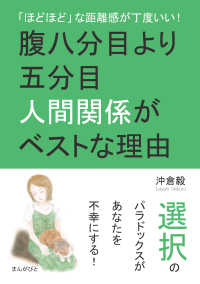- ホーム
- > 洋書
- > 英文書
- > Religion / Ethics
Full Description
This is an accessible resource for students and practitioners to become aware of the significance of self-knowledge for the provision of sensitive spiritual and pastoral care. The greatest asset which people in pastoral care offer to in a caring relationship is themselves or to be more precise the aspects of self which they have reflected upon. Offering oneself to other people in order to provide companionship along the road of life, especially when the particular stage on the journey is one of anticipated or actual loss, is an act which is both challenging and yet potentially life enhancing for a carer. The purpose of this book is to offer an aid to those who seek to understand themselves better with a view to enhancing the quality of spiritual and pastoral care they offer. Here the reference point for reflexivity is the caring relationship but as we are fundamentally the same beings in personal and professional relationships then perhaps readers may also find stimulus to reflect on what they bring to a variety of relationships including that with the Sacred and, indeed, themselves.
Contents
Introduction; Including definitions of spiritual and pastoral care. What the book is and is not.; Chapter 2 -Gifted Self; Exploring some of the innate gifts a carer may possess which enables her to develop and maintain caring relationships with people, especially in times of transition or distress.; Chapter 3 - Vulnerable Self; Themes explored include; Limited Self - limits to our knowledge, ability, time and energy; Grieving Self (loss and self), including mortal self - death and limitation of length of life giving meaning and freedom to life lived till death. Other griefs we live with are the end of relationships, jobs or particular roles, loss of potency and physical abilities.; Wounded Self - the scars of our experiences are part of who we are and inform our understanding of other people's lived experience of loss, bereavement or distress; Chapter 4; Powerful (and potentially wounding) self - need for ethics - codes of conduct, parameters within which to work to protect the vulnerable and ourselves; Chapter 5; Self in Relationships; Formed self (self and upbringing/family); Transference and countertransference; Co-constructed self - self formed through social interaction; With self - conscious self and unconscious self (esp our shadow); Chapter 6; Meaningful (spiritual) self - aspects of our personhood that give meaning and purpose to our lives; Believing self - what are our beliefs and how are they formed and reformed through - corporate worship - formation and reformation of values and beliefs through sharing in ritual and liturgy - contemplative/solitary activities - feeding our souls individually through seeking solitary engagement with the Divine within and without self; Playful/creative self - - letting senses playfully roam - art, gardening, writing, poetry, music - that which feeds the soul.; Working/vocational self - motivation, need to be needed; Chapter 7; Sexual self - how we understand and feel about ourselves as physical embodied persons whose care involves physical touch, gesture and posture. Sexuality is not just about orientation and the genital expression/fulfillment of our sexual desires.; Chapter 8; Self-awareness as an ongoing activity.; Developing Self - ongoing reformation of self through reflexivity; - reflection on practice through supervision, with colleagues; - journaling, spiritual direction including monitoring balance of work, play, social and solitary dimensions of life, personal and professional development; - learning through our own transition, life crises - counseling, psychotherapy; - use of structured tools to aid self-knowledge and how we relate eg Myers-Briggs, the Enneagram.




![Tex : l'ultima vendetta ([Libri Tex])](../images/goods/../parts/goods-list/no-phooto.jpg)



